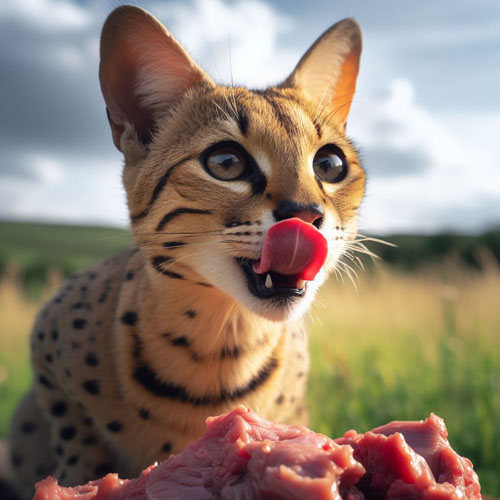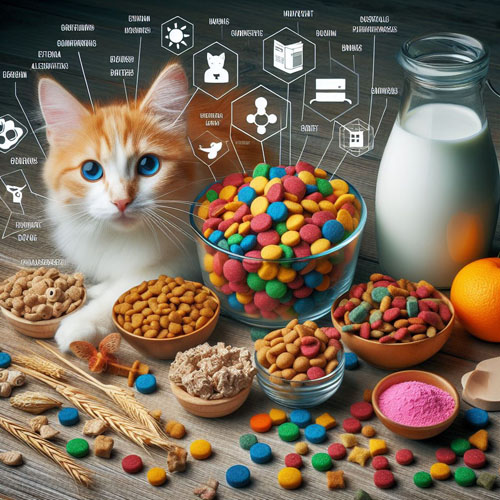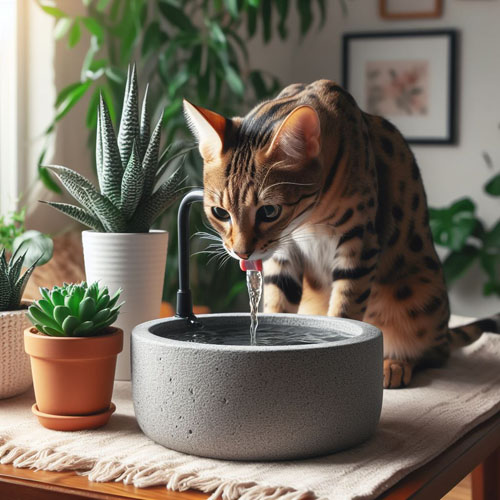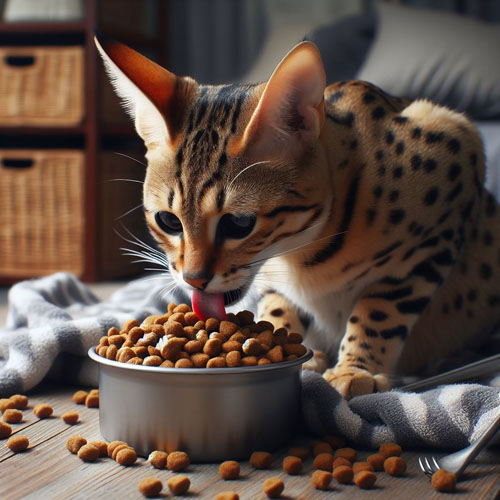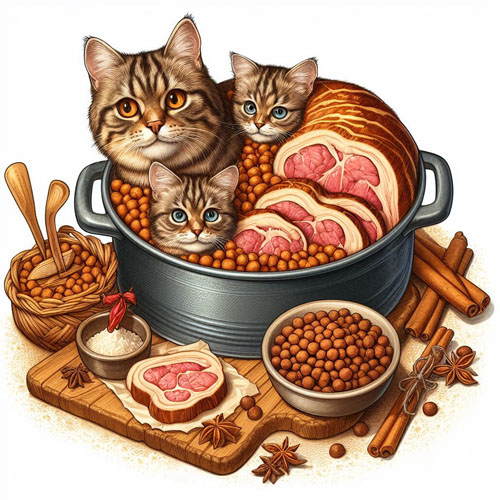The Importance of Taurine for Felines
Taurine is an essential amino acid for felines, playing a crucial role in their overall health and well-being. Cats, including the magnificent Savannah cat, have a unique dietary requirement for taurine. Its deficiency can lead to severe health problems and complications. Understanding the importance of taurine and ensuring adequate intake is vital for cat owners to maintain their furry friends’ optimal health.
Taurine, classified as an amino acid, represents a small molecule capable of combining with other amino acids to create proteins. Amino acids, often referred to as “the building blocks of life,” and the proteins they generate play essential roles in numerous bodily processes.
Among the amino acids, nine are deemed essential, while others are considered non-essential. Taurine in cats stands out as an exception, being crucial for them and classified as an essential amino acid. Cats exhibit a heightened sensitivity to taurine deficiencies compared to other animals or humans.
Natural sources of taurine include meat, especially red meat, fish, and certain dairy products. Given their status as obligate carnivores, cats have evolved with a dietary requirement for taurine. Due to the swift metabolism of taurine in cats, they must incorporate it into their daily diet.
Taurine serves numerous critical functions in a feline’s body. It is necessary for the proper development and function of the heart, eyes, digestive system, and immune system. Without sufficient taurine intake, cats may experience various health issues, ranging from mild symptoms to life-threatening conditions.
Before the importance of taurine in cats was widely recognized, early commercial cat foods lacked sufficient levels of this essential nutrient.
Before the 1980s, a shift occurred in cat ownership, transitioning from allowing cats to roam outdoors for hunting to keeping them predominantly indoors. This shift led to the increased prevalence of Dilated Cardiomyopathy (DCM), retinal degeneration, and digestive health issues in cats fed commercial diets.
During the pre-1980s era, Dilated Cardiomyopathy (DCM) was the most common heart disease in cats, surpassing Hypertrophic Cardiomyopathy (HCM), which is now more widely recognized. It wasn’t until the 1980s that the link between taurine and DCM was established, revealing a deficiency of taurine in commercial cat food as a major contributor to the widespread occurrence of DCM in cats. Since pet food companies began universally supplementing taurine in cat food during the mid to late 1980s, cases of DCM have significantly decreased.
While rare, DCM may still be observed in some cats, especially those fed inappropriate homemade or vegan diets lacking proper meat sources and, consequently, taurine. Consulting with a veterinary nutritionist is crucial to ensure that homemade cat food includes the necessary vitamins, minerals, and nutrients, including taurine.
One of the primary roles of taurine is to support cardiac health. A taurine deficiency can lead to dilated cardiomyopathy, a condition in which the heart becomes enlarged and weak. This can result in symptoms such as lethargy, rapid breathing, and an irregular heartbeat. Without intervention, dilated cardiomyopathy can be fatal.
Furthermore, taurine plays a crucial role in maintaining healthy eyesight. Cats are known for their exceptional vision, and taurine is a key nutrient for their eye health. Lack of taurine can lead to vision problems, including degeneration of the retina, which can ultimately result in partial or even total blindness.
Taurine is also involved in the feline digestive system. It aids in the digestion and absorption of nutrients. When taurine is deficient, cats may experience digestive disorders, including diarrhea, vomiting, and poor appetite. These symptoms can lead to weight loss and malnutrition, further exacerbating their health issues.
Another significant function of taurine is its role in supporting the immune system. Cats with taurine deficiency may have a weakened immune response, making them more susceptible to infections and diseases. Additionally, taurine deficiency can hinder the production of essential antioxidants, further compromising the overall health of felines.
Given the unique dietary requirement for taurine, cat owners must ensure their pets receive an adequate amount through their diet. While taurine is present in significant quantities in meat and fish, it is essential to feed cats a balanced diet that meets their nutritional needs. Commercial cat food is often fortified with taurine, ensuring that cats receive the necessary amount of this essential amino acid. However, it is crucial to read labels and choose high-quality cat food brands that prioritize taurine supplementation.
Taurine is an essential amino acid for cats, and while it is naturally found in meat, the specific meats rich in taurine can vary. For Savannah cats, it is crucial to provide a diet that includes meats such as chicken, turkey, and beef, as these are excellent sources of taurine. These meats not only contribute to the overall protein intake necessary for a feline diet but also help meet the specific taurine needs of Savannah cats.
Organs, especially heart meat, are particularly rich in taurine and are highly recommended for inclusion in the diet of Savannah cats. Hearts from various animals like chicken, turkey, and beef are not only delicious for felines but also provide essential nutrients, including taurine, to support their cardiovascular health. Additionally, a balanced and varied diet that includes a mix of these taurine-rich meats helps ensure that Savannah cats receive all the necessary nutrients for their overall well-being. However, cat owners need to consult with veterinarians or feline nutrition experts to tailor the diet to the specific needs of their Savannah cats.
If a Savannah cat or any other feline is suspected of having a taurine deficiency, immediate veterinary intervention is necessary. A veterinarian will conduct a thorough examination and potentially perform blood tests to determine the cat’s taurine levels. If deficient, the veterinarian may prescribe taurine supplements or recommend a dietary change to correct the deficiency. Regular check-ups and ongoing monitoring of taurine levels are crucial to prevent any re-occurrence of deficiency.
The generally recommended taurine dosage for cats falls within the range of 250 to 500 milligrams per cat every 12 hours. Taurine, known for its safety and affordability, allows for a broader dosage spectrum. If your cat is getting taurine from dry, wet, or raw food, you will only need to supplement if there are peas in the food. Peas cause cats not to be able to absorb taurine easily.
When considering taurine dietary supplementation for your cat, especially in cases of diagnosed heart conditions, it is advisable to seek guidance from your veterinarian or a veterinary cardiologist to determine the most suitable dosage for your cat’s specific condition.
In conclusion, taurine plays a vital role in maintaining the health and well-being of felines, including Savannah cats. A taurine deficiency can lead to various health issues, such as heart problems, vision impairment, digestive disorders, and a weakened immune system. Cat owners must ensure their furry friends receive an adequate amount of taurine through a balanced diet or supplementation. Regular veterinary check-ups and ongoing monitoring are crucial for maintaining optimal taurine levels and preventing potential health complications. By understanding the importance of taurine and taking appropriate measures, cat owners can contribute to their beloved pets’ long and healthy lives.
